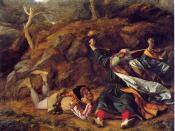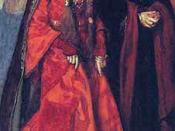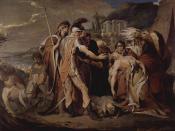In this production of Shakespeare's King Lear, a feminist reading of the play has been chosen to be presented to the audience. Certain important factors must be taken into consideration as to how this reading will be reflected on stage. Thus, we will examine, in detail, two important scenes: Act I, scene i, and Act IV, scene iv, their impact on the action and main issues of the play (ambition/ greed, power, corruption, appearance versus reality and growth through suffering) and how the characters, specifically the women roles, are to be portrayed to reflect this particular critical reading.
Act I, scene i, is worthy of our attention as a valid representation of the major issues within the play, an impetus for the play's ensuing conflict and a display of the nature of the characters. The scene opens with Gloucester and Kent discussing Lear's plan to retire and partition his kingdom amongst his daughters.
The king's public drama of the love test denotes the insecurity and fear of an old man who requires reassurance of his importance, blindly accepting his elder daughters' seditious falsehoods. As opposed to a genuine assessment of his daughters' love for him, the test seems to invite, rather demand, flattery. Goneril and Regan's professions of love are banal and insecure, 'I love you more than word can wield the matter,' however Lear unreservedly welcomes these trite remarks. Regan echoes her sister by saying, 'I find she names my very deed of love; only she comes too short.' In contrast to her sisters, Cordelia, the youngest and favourite daughter responds to Lear's emotional demands by answering 'Nothing, my lord.' Markedly, she has a much greater degree of forthrightness and assurance: 'Unhappy as I am I cannot heave my heart into my mouth,' a metaphorical statement that enrages...


